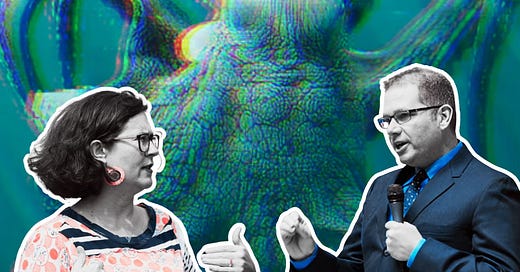Washington lawmakers want to ban farmed octopus—because apparently, that’s a priority
While crime surges and housing remains unaffordable, Olympia is focused on cephalopods.
Washington Democrats, led by Rep. Strom Peterson (D-Edmonds) and Sen. Liz Lovelett (D-Anacortes), are pushing House Bill 1608 and Senate Bill 5626, which would ban the farming, selling, and distribution of farmed octopus in Washington State.
While supporters claim this is about "animal welfare," in reality, this is a symbolic ban with little practical impact, driven more by emotional arguments than scientific evidence.
If these bills pass, expect:
More government overreach into private industries
Washington businesses losing economic opportunities in aquaculture
Politicians patting themselves on the back for “solving” a nonexistent problem
This isn’t about protecting animals—it’s about virtue-signaling while ignoring Washington’s real problems.
What HB 1608 and SB 5626 do
These bills would:
Prohibit the sale, transport, and distribution of farmed octopus in Washington State
Ban the farming of any octopus species in Washington waters or facilities
Impose fines of up to $10,000 for violations
Washington lawmakers are choosing to regulate an industry that doesn’t even exist in the state, effectively blocking future development in aquaculture based on speculative concerns.
Why this bill is absurd
It eliminates economic opportunities for Washington businesses
Aquaculture is a rapidly growing industry that has the potential to provide jobs, food security, and economic growth.But instead of fostering innovation, Washington lawmakers are banning an industry before it can even take off.
Other countries and states are researching sustainable octopus farming—Washington is choosing to opt out entirely.
This bill removes any chance of scientific progress in humane aquaculture methods.
Banning industries before they exist sends a clear message: Washington is hostile to business.
It prioritizes emotion over science
Supporters claim that octopuses are too intelligent to farm, citing their ability to solve puzzles and escape enclosures. But:
Many animals commonly raised for food—pigs, cows, and chickens—are also highly intelligent.
Farmed octopus could be raised under humane, ethical conditions, just like other animals.
The decision to farm or not should be based on scientific research, not arbitrary bans.
It’s a distraction from real issues
Washington is dealing with rising crime, out-of-control housing costs, and skyrocketing taxes—but lawmakers are spending time on a ban that affects no one.
Is farmed octopus really the most pressing issue facing Washingtonians?
How does this bill make life better for residents struggling with affordability?
Why is the legislature focusing on hypothetical industries instead of fixing existing problems?
The answer? Because it’s easier to pass feel-good legislation than solve real problems.
Who benefits from this bill?
Politicians who want to appear progressive on animal welfare.
Activist groups pushing symbolic bans instead of scientific solutions.
Regulators looking for new ways to expand government control.
Who doesn’t benefit?
Washington businesses that could have explored sustainable aquaculture.
Consumers who may want access to responsibly farmed seafood.
Taxpayers, who fund lawmakers focused on niche issues instead of real challenges.
This bill isn’t about protecting animals—it’s about grandstanding while ignoring Washington’s real issues.
What’s next?
If HB 1608 and SB 5626 pass, expect:
More unnecessary bans on industries that don’t even exist.
Continued government interference in economic innovation.
A signal to businesses that Washington is not a place for new ideas.
Instead of fostering responsible growth, lawmakers are choosing to regulate based on emotion, not facts.




